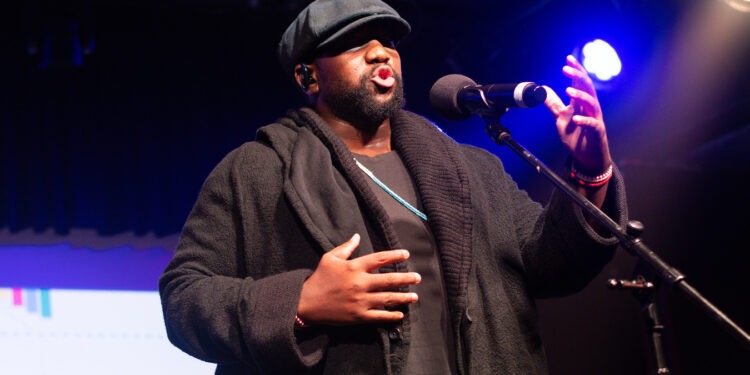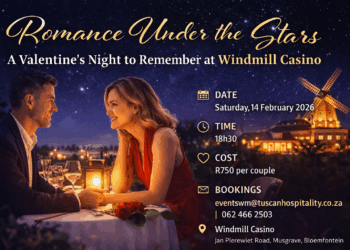In a night that felt both historic and intimately local, Zewande BK Bhengu was crowned South African Slam Poetry Champion at the finale of the 29th Poetry Africa festival. The victory at Seabrooke’s Theatre capped a week of performance, pedagogy and global exchange hosted by the Centre for Creative Arts at the University of KwaZulu-Natal — a festival this year framed under the theme Poetry: An Architecture for Social Justice.
Bhengu’s win closed the festival’s Slam Jam Finale — an electrifying showcase hosted by Quaz Roodt — that narrowed a field of the country’s sharpest spoken-word artists to five finalists: Belita Andre, Karabo Bopape, Tiisetso Maeane, Tshepo Molefe and Zewande BK Bhengu. After two rounds and a panel of distinguished judges — Olive Olusegun (South Africa), Nick Makoha (Uganda/UK) and Luleka Mhlanzi (South Africa) — Bhengu emerged the champion, with Tiisetso Maeane placing second and Belita Andre third.
A return, a reckoning, a validation
For Bhengu — who had not competed on the Slam stage since 2018 — the crown was a personal homecoming. He told audiences and organisers that returning to performance after a long break proved that “writer’s block is only a moment and not forever,” and described his win as “validating, humbling and a little bit awkward.” Those sentiments are emblematic of the Slam’s power: a place where risk, rawness and repair meet rhythm and rhetoric.
Bhengu’s work, as catalogued on the Poetry Africa programme, is known for interrogating identity, poverty, Black masculinity and the intimate politics of family life. Judges and audiences praised both the visceral quality of his writing and the careful craft of his delivery — traits that made him a fitting winner in a field defined by sharp political urgency and technical dexterity. As champion, Bhengu receives a R20,000 cash prize, an international poetry trip and the honour of representing South Africa at the World Poetry Slam Championships when Poetry Africa hosts the global event in Durban in October 2026.
More than performance: training, rights and sector building
Poetry Africa 2025 positioned itself as more than a showcase; the festival invested heavily in capacity building and sectoral infrastructure. Over 100 poets, facilitators and industry practitioners participated in hybrid sessions, workshops and panels. Notable interventions included a DALRO workshop led by Katlego Gabashane on copyright and creative rights — the practical know-how that allows poets and performers to translate art into sustained livelihoods. The festival’s SAIDE Scholar Session, supported by the Kresge Foundation, featured Siyaphumelela scholars performing original I Am poems, part of a longer partnership aimed at mentoring and platforming emerging voices.
New platforms and new voices
Poetry Africa’s programmes this year also launched initiatives aimed at sector data, collaboration and economic uplift. The Poetry Comedy Storytelling Council (PoeComSto) announced a KwaZulu-Natal programme and a Data Mapping Project intended to surface networks, gaps and opportunities across the province’s creative economy. The festival’s Chalkboard Slam — a fast, public heat for rising performers — crowned Naledi Mafole as a standout emerging talent, underscoring the festival’s twin commitments to excellence and access.
Theatre, pedagogy and applause
Beyond spoken word competitions, audiences were treated to sold-out shows and theatrical work that underscored the festival’s range. The UJ Arts Academy’s Two Sides of the Same Coin — directed by Xolani Mbhele — met with warm applause, offering festivalgoers a reminder that poetry at its best engages theatre, staging and embodied storytelling. Festival director Ismail Mahomed publicly thanked funders and partners — including UKZN, the KwaZulu-Natal Department of Sports, Arts and Culture, the National Lotteries Commission and support from international partners such as the French Institute and the Ukrainian Institute — for enabling the festival’s hybrid, outward-looking programme.
What the win means for the scene
Zewande BK Bhengu’s title does more than signal personal triumph; it marks a moment of renewal for South Africa’s Slam ecosystem. Returning champions and debut finalists share festival stages in a healthy ecosystem where mentorship, critical conversation and institutional support matter. The promise of an international trip and the responsibility of representing South Africa at the 2026 World Poetry Slam — to be hosted in Durban during Poetry Africa’s 30th edition from 5–10 October 2026 — ties local achievement to an increasingly global spoken-word circuit.
A forward horizon
As Durban prepares to host the 2026 World Championship, the momentum from this year’s festival will matter: for artist development, for rights education, for a data-informed creative economy and for the kinds of bursaries and mentoring that turn a surplus of talent into sustainable careers. For audiences and practitioners alike, the 29th Poetry Africa festival confirmed a simple truth — poetry remains a public instrument for justice, repair and collective imagination, and its practitioners remain among the sharpest witnesses to South Africa’s present and future.



































